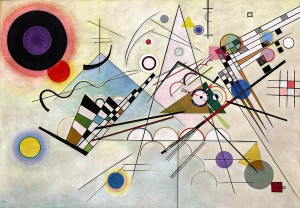
I found a tumblr specifically of illustration of Calvino’s Invisible Cities! Some are abstract and some are more literal. It’s really interesting to look through and see the vast range of ideas and images that can be produced from one text.
http://seeingcalvino.tumblr.com/
Author Archives: adriennebellkoch
Abstracting Music

The current project as made me start thinking about the challenge of abstracting ideas and words. It reminds me of the work of Kandinsky, a painter who sought to create abstract paintings of music. In a similar way to our project, he is using something form the world to create abstract forms and meaning; however, his challenge was to turn a purely abstract thing and turn it into a physical interpretation.I think his story and philosophy of painting is inspirational as an artist and designer. His use of color and line to create rhythm could be useful in this project.
Semiotics for Designers
I saw that a lot of people were posting and talking about semiotics, so I figured that I would post this website which I found helpful in understanding the subject. It gives an overview of semiotics as well as a glossary of terms.
This is useful if you are confused about any of the terms from the readings/class.
Semiotics and Popular culture
In the reading for class today, the authors discuss a couple of semiotic theorists who extended it from the linguistic realm to a general approach for a wide variety of topics. The semiotician Barthes created a theory of contemporary semiotics, which included the idea of myths. Baudrillard was a philosopher who looked into the consequences of contemporary semiotics in our culture. He proclaimed the death of reality because the signifier no longer signified anything in reality, but instead engulfs the signified in external meaning. I wanted to do more research on him because I didn’t exactly understand how he jumped from the idea of signs to the nonexistence of reality. I found this short video which uses his philosophy to talk about media.
It’s pretty hyperbolic, which is in line with Baudrillard’s philosophy, but I was interested in a specific part of the video where he says that events are presented as a “copy of a copy” of the original. As a news story is repeated, it is turned into a mythical sign, because it is no longer referring to the original, but to the idea of the event created with the media. Barthes wrote that “myths don’t lie, they distort” information into “depoliticized speech”. Maybe this is the cause of the desensitization of the public to media.
Negative Space in Design

(Moby Dick design by Alexander Johnson)
While searching for inspiration for this project, I found this article. It gives examples of designers using negative space in clever designs. Not all of them are black and white, but I still thought it would be interesting for everyone!
http://www.creativebloq.com/art/art-negative-space-8133765
